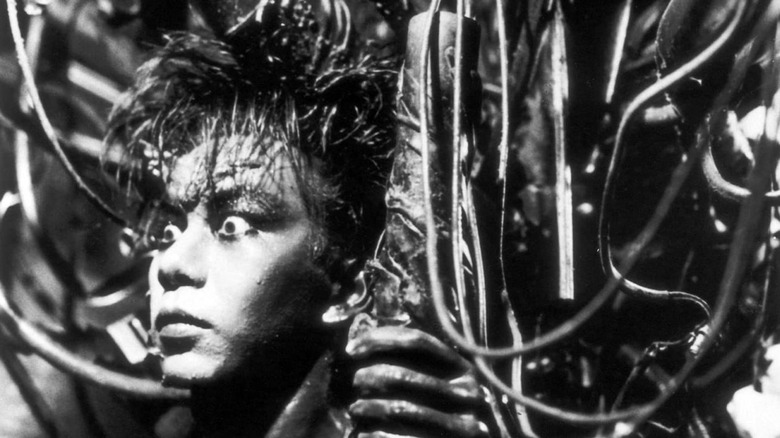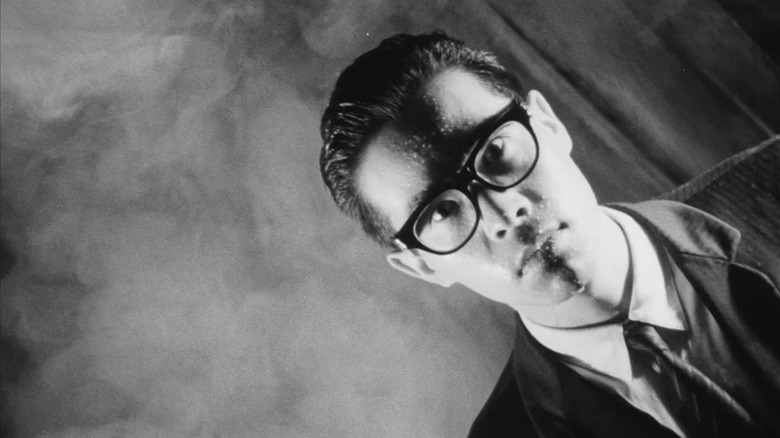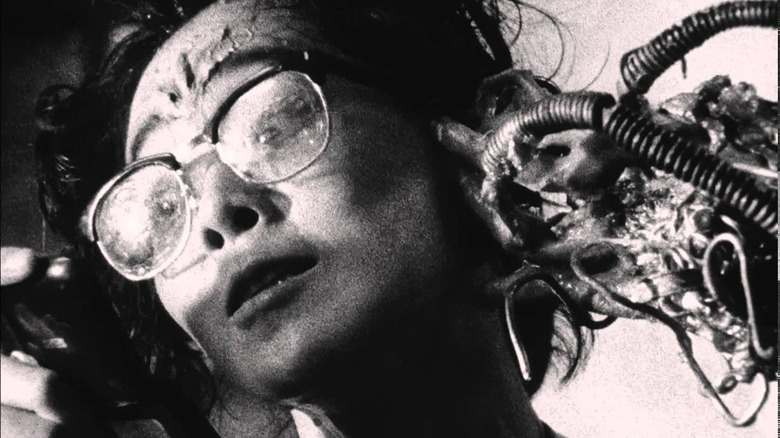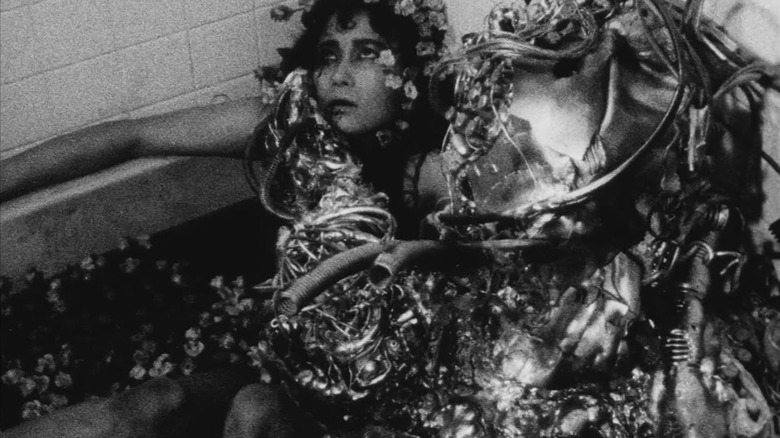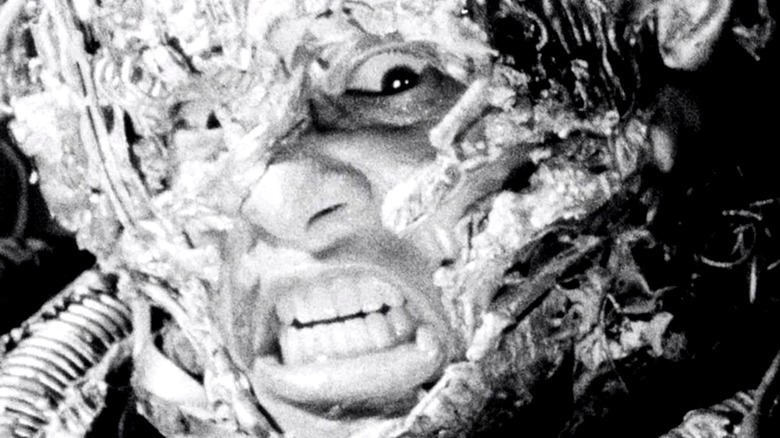The Daily Stream: Tetsuo: The Iron Man And The Horrors Of Mechanized Modernity
(Welcome to The Daily Stream, an ongoing series in which the /Film team shares what they've been watching, why it's worth checking out, and where you can stream it.)
The Movie: "Tetsuo: The Iron Man"
Where You Can Stream It: AMC+, Kanopy, Shudder, Spectrum, Arrow Video
The Pitch: For those who love body horror, but feel the disease and bodily mutation of David Cronenberg to be too cerebral, or the bloody rendings and torture of an Eli Roth to be too crass: Might I point you toward Shinya Tsukamoto's 1989 underground cult classic "Tetsuo: The Iron Man?" Shot mostly on the fly on grainy, aggressive B&W 16mm, and running a scant 67 minutes, "Tetsuo" carves deep into the anxiety-riddled, Freud-poked parts of the brain to tell a nightmarish horror fantasy about sexuality, modernity, and rust.
It is a crazed tale of metal fetishism and the soullessness of urban life at the end of the millennium, presented with the visual verve and breakneck, action-packed pace of a "Dragon Ball Z" episode. Imagine James Cameron's "The Terminator" by way of Cronenberg's "The Fly." Or if the cold, smoky, dehumanizing cityscapes of "Eraserhead" served as the inspiration for a stop-motion animated action picture. There is nothing quite like "Tetsuo: The Iron Man."
Why it's essential viewing
Themes of modernity stretch across a good deal of Japanese cinema (essays on the topic are legion), and never has there been a more viscerally stark reminder of the encroachment of mechanized 20th-century life into the soft, mushy underbelly of the human body than in "Tetsuo: The Iron Man." This is a world were the organic is being erased, either by mechanization's overwhelming, dehumanizing ubiquity, or whose erasure is being embraced and encouraged — angrily, gleefully, with a punk rock middle finger to the stodgy, biological past.
Many critics have described "Tetsuo: The Iron Man" as "cyberpunk," but don't expects shades-wearing, Jolt-drinking, ultra-cool computer hacker anarchists on roller blades; "Tetsuo" is not flipping off the government or ineffectually kicking dust onto the shoes of fascism. "Tetsuo" is raising its middle finger to a world that still clings foolishly to personal autonomy. If our bodies are to be cold, sexualized commodities, then let's run with it. Let's fight over it. Then let's become a giant phallus and turn the world into rust.
Metal fetishization
The plot, such as it is, follows a nondescript Japanese salaryman, credited only as "Man" (Tomorowo Taguchi) as he discovers a small wire protruding from his cheek. This is the first symptom in a condition that will find his body sprouting more and more mechanical parts, until his face is three-quarters consumed by machinery, his hands become blades that stab handily into electrical outlets, and his genitals become an enormous drill. That last detail will become significant when he finds a rival in a fellow equally mechanized rival Guy (Tsukamoto himself) and the two of them will cross swords, as it were, as they take to the streets and enact a twisted, low-budget, technovomit version of a superhero fight. Apologies to Tony Stark, but he is truly an Iron Man.
"Tetsuo" opens with perhaps its most difficult scene: Guy is seen slicing his leg open and slowly inserting a metal rod all the way down into the wound. Not content to be dehumanized by a mechanized world, the metal fetishist is forcing change upon himself. Only machines and flesh aren't yet too chummy in this universe, and the wound attracts maggots. In a panic, the Guy runs out into the street, only to be run down by Man and his girlfriend. Man will hide the body and go about his life; a dull, dull life wherein he and his girlfriend barely speak on the phone (they can only say "moshi-moshi" repeatedly) and he rides the subway to work in silence. The silence is broken when Man is attacked in public by a woman with machines in her hands and face. Following the attack, Man's own surreal journey of bodily transformation will begin.
I broke apart my insides
Shinya Tsukamoto, as one might intuit from the rough-hewn, exploding, experimental visuals of "Tetsuo," began his filmmaking career as an enthused teenage David Lynch fan with a Super 8 camera. He made several surrealist horror short films and features before making a splash with "Tetsuo," a cult film that snagged the eyeballs of adventurous video store denizens in the early 1990s. Tsukamoto would continue to rattle the underground circuit throughout the decade with "Tokyo Fist," "Bullet Ballet," and a sequel to "The Iron Man" called "Tetsuo II: Body Hammer." The sequel also featured machinery sprouting from the protagonist's body, but this time it would be shot in shimmering, high-contrast color, and the machines would all be guns and weapons. "Body Hammer" contains a little more pat a message — rage is part of every human, and our propensity to do violence is an element of our biology — but is striking nonetheless. Years later, in 2010, Tsukamoto would return with "Tetsuo: The Bullet Man," a remake-cum-amalgam of the first two films, now in English, and featuring a song by Nine Inch Nails.
One might also recognize Tsukamoto from his acting work. He appeared in two Takashi Miike films, including the awesomely extreme "Ichi the Killer" (2001), as well as the horror film "Marebito," the awesome "Shin Godzilla," and in Martin Scorsese's "Silence." Despite his propensity for extremes, Tsukamoto is soft-spoken, intellectual, and happy to analyze his own movies. Speaking at a panel at San Diego Comic Con in 2009, Tsukamoto explained "Bullet Man," and exactly what it was meant to be about. Unlike his progenitors Lynch and Cronenberg, Tsukamoto will happily dissect his own work.
Nightmare wires
Rewatching the lo-fi freakout "Tetsuo: The Iron Man" proves that the film has lost none of its visceral power and, indeed, that the slickness of most modern filmmaking equipment has robbed a lot of underground cinema of its grit, of its ability to shock. "Tetsuo" may be noted for its sci-fi/horror images, its blood, its phalli, its swirling vortex of nightmare wires digging into your brain. But more notable is its uncanny punk rock attitude. "Tetsuo" is an aggressive, off-putting experience, meant to rattle your teeth, shake you out of your complacency, cackle at the squares who can't take it.
And, in so doing, it elevates to greatness.
